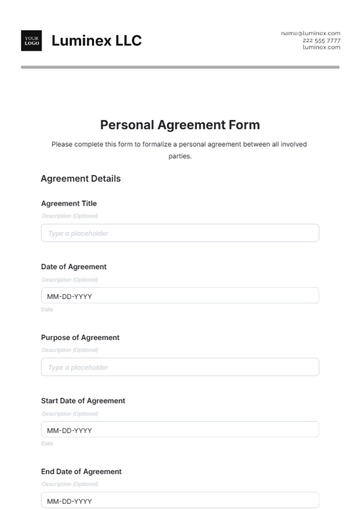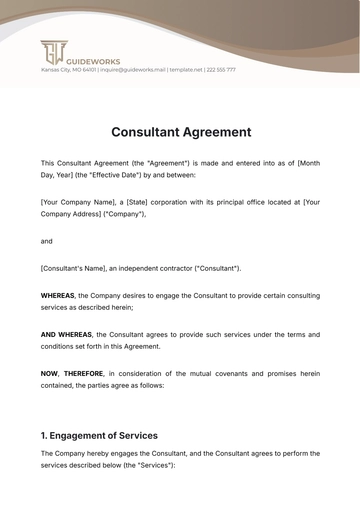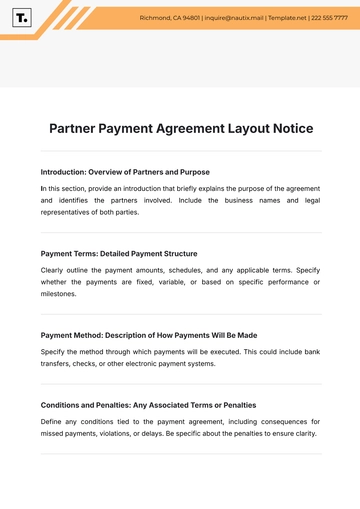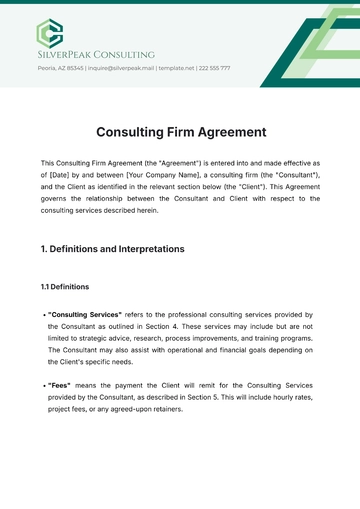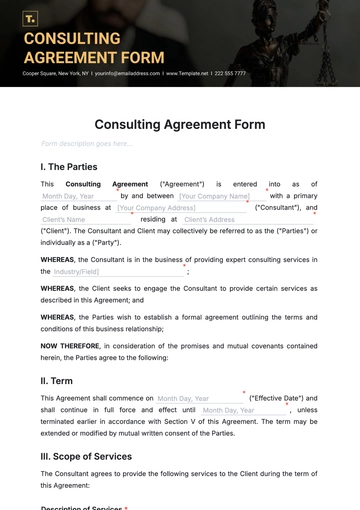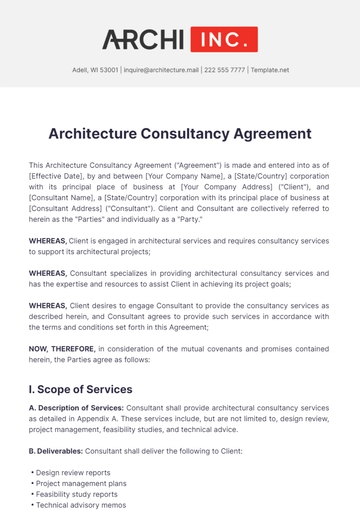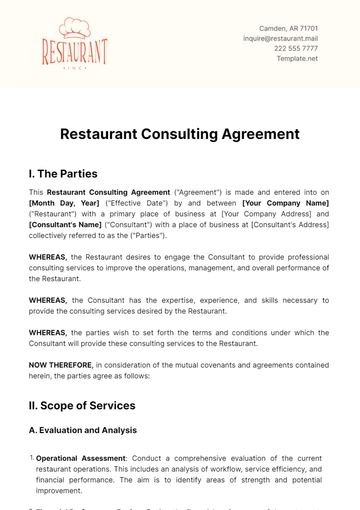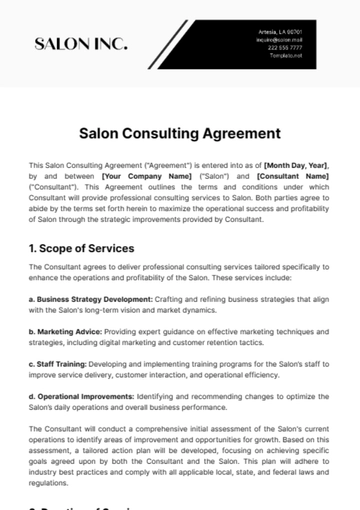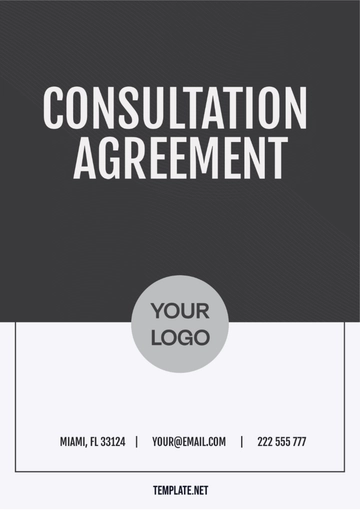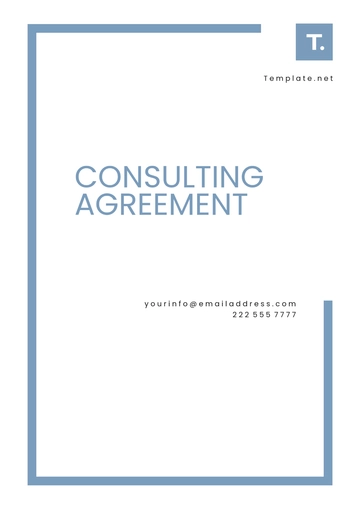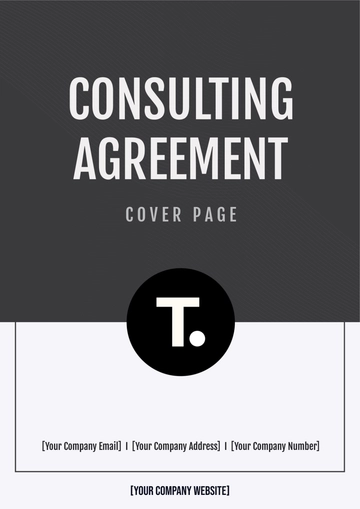Free Restaurant Consulting Agreement
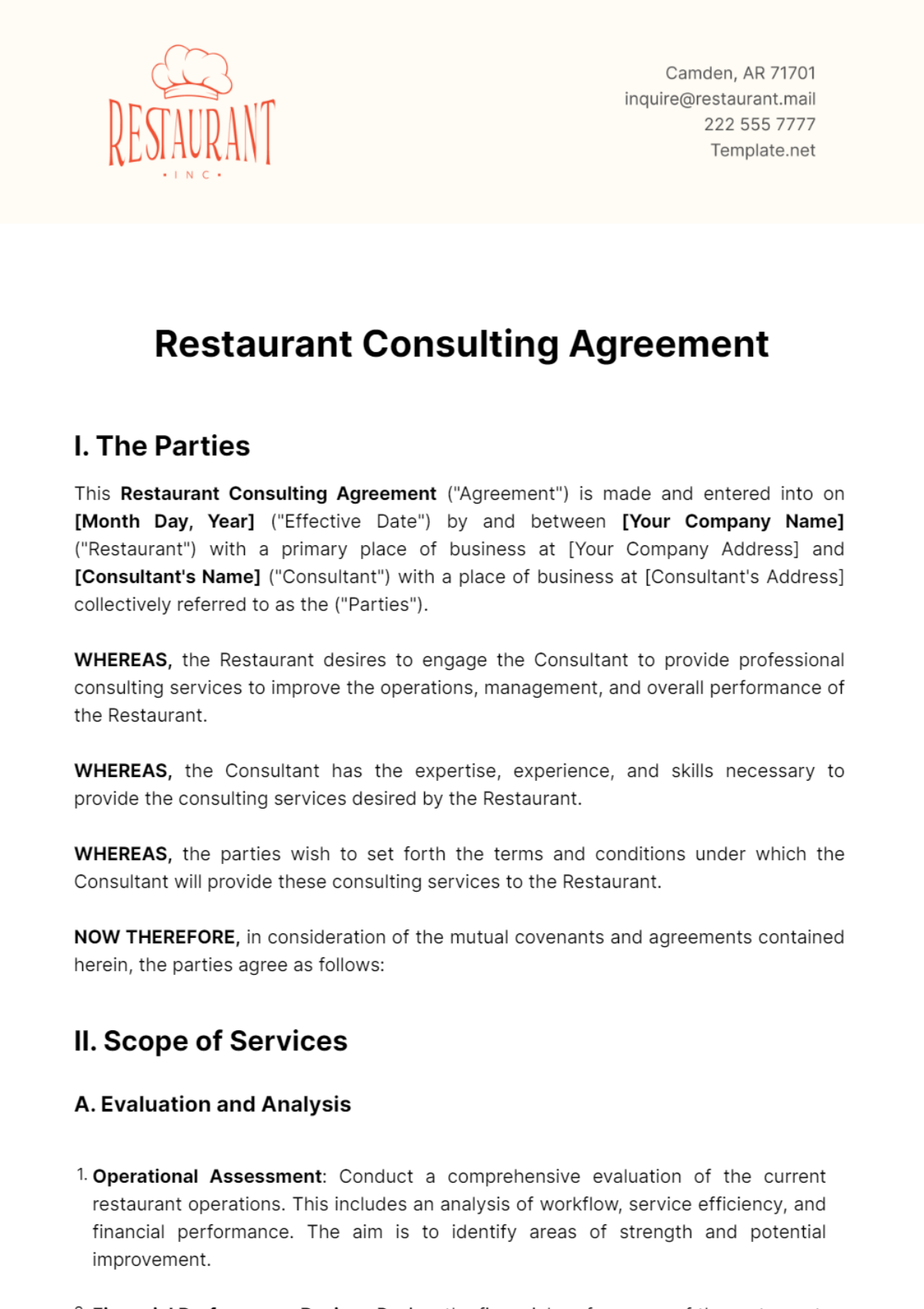
I. The Parties
This Restaurant Consulting Agreement ("Agreement") is made and entered into on [Month Day, Year] ("Effective Date") by and between [Your Company Name] ("Restaurant") with a primary place of business at [Your Company Address] and [Consultant's Name] ("Consultant") with a place of business at [Consultant's Address] collectively referred to as the ("Parties").
WHEREAS, the Restaurant desires to engage the Consultant to provide professional consulting services to improve the operations, management, and overall performance of the Restaurant.
WHEREAS, the Consultant has the expertise, experience, and skills necessary to provide the consulting services desired by the Restaurant.
WHEREAS, the parties wish to set forth the terms and conditions under which the Consultant will provide these consulting services to the Restaurant.
NOW THEREFORE, in consideration of the mutual covenants and agreements contained herein, the parties agree as follows:
II. Scope of Services
A. Evaluation and Analysis
Operational Assessment: Conduct a comprehensive evaluation of the current restaurant operations. This includes an analysis of workflow, service efficiency, and financial performance. The aim is to identify areas of strength and potential improvement.
Financial Performance Review: Review the financial performance of the restaurant, including revenue, costs, and profitability. This will help identify areas where cost efficiency can be improved and revenue can be increased.
Service Efficiency Analysis: Assess the efficiency of the service provided at the restaurant. This includes the speed of service, the quality of customer interactions, and the effectiveness of the service process.
B. Development and Implementation of Strategies
Operational Efficiency Improvement: Develop and implement strategies aimed at improving operational efficiency. This could include streamlining workflows, improving supply chain management, or enhancing inventory control systems.
Customer Satisfaction Enhancement: Devise strategies to enhance customer satisfaction. This could involve improving the quality of food, enhancing the dining experience, or improving customer service.
Profitability Enhancement: Work on strategies to enhance the profitability of the restaurant. This could involve cost control measures, pricing strategies, or revenue enhancement initiatives.
C. Training Programs
Service Quality Enhancement: Develop training programs for staff to enhance the quality of service provided at the restaurant. This could involve training on customer interaction, handling complaints, or improving efficiency.
Operational Knowledge Enhancement: Provide training to enhance the operational knowledge of the staff. This could involve training on food preparation, inventory management, or health and safety regulations.
D. Menu Development and Optimization
Market Trend Analysis: Conduct a thorough analysis of current market trends in the restaurant industry. This includes understanding popular cuisines, dishes, and dining experiences. The Consultant will also consider customer preferences, which can be gathered from customer feedback and reviews.
Menu Optimization: Based on the market trend analysis, the Consultant will work on optimizing the menu. This could involve introducing new dishes that align with current trends, removing underperforming items, or adjusting pricing to maximize profitability. The Consultant will work closely with the Restaurant’s chef and management team to ensure the new menu aligns with the Restaurant’s brand and capabilities.
Menu Testing: Before finalizing the menu, the Consultant will recommend conducting menu testing. This involves preparing the new dishes and getting feedback from a select group of customers. The feedback will be used to make any necessary adjustments to the menu.
E. Monitoring and Reporting
Performance Monitoring: Conduct ongoing monitoring of the Restaurant’s performance following the implementation of recommended changes. This involves tracking key performance indicators (KPIs) such as sales, customer satisfaction scores, and operational efficiency metrics.
Reporting: Provide regular reports to the Restaurant’s management team. These reports will detail the Restaurant’s performance, the impact of the implemented changes, and recommendations for further improvements.
Performance Review Meetings: Schedule regular performance review meetings with the Restaurant’s management team. During these meetings, the Consultant will present the reports, discuss the Restaurant’s performance, and answer any questions the management team may have.
III. Compensation
A. Payment Schedule
Monthly Payments: Payments shall be made on the [1st day] of each month, commencing on the Effective Date. This ensures that the Consultant receives timely compensation for the services provided.
Late Payment Consequences: If the Restaurant fails to make the payment by the due date, the Consultant may charge a late fee of [1.5]% per month on the overdue amount. This late fee is calculated from the due date until the payment is received.
B. Reimbursement of Expenses
Pre-Approval Requirement: Any additional expenses incurred by the Consultant, which are necessary for the provision of services, must be pre-approved by the Restaurant. This ensures that the Restaurant has control over its budget and is not surprised by unexpected costs.
Reimbursement Process: Approved expenses will be reimbursed within [30] days of receipt of an itemized invoice from the Consultant. The Consultant will provide receipts or other documentation to support the expenses.
Expense Documentation: The Consultant is required to provide appropriate documentation for all expenses for which reimbursement is sought. This ensures transparency and accountability in the reimbursement process.
C. Additional Compensation
Performance-Based Bonus: In addition to the monthly consulting fee, the Consultant may be eligible for a performance-based bonus. The specifics of this bonus, including the performance metrics and bonus amount, will be agreed upon by both parties.
Expense Allowance: The Restaurant may provide the Consultant with an expense allowance for certain pre-approved expenses. This allowance will be in addition to the monthly consulting fee and will be subject to the same reimbursement process and documentation requirements.
Travel Compensation: If the Consultant is required to travel for the provision of services, the Restaurant will compensate the Consultant for travel expenses. This includes transportation, accommodation, and meal expenses. These expenses must be pre-approved by the Restaurant and are subject to the reimbursement process and documentation requirements.
IV. Confidentiality
A. Definition of Confidential Information
Proprietary Information: Proprietary information refers to any data or information that is important to the Restaurant’s business and not generally known to the public or competitors. This includes, but is not limited to, information about the Restaurant’s products, services, customers, marketing strategies, and financial data.
Trade Secrets: Trade secrets are a subset of proprietary information and include any business or technical information, such as a recipe, technique, or process, that the Restaurant uses in its business and that gives the Restaurant an advantage over competitors who do not know or use it.
Non-Public Information: Non-public information refers to any information that is not publicly available. This could include internal reports, unpublished financial information, or any other information that is not generally known to the public.
B. Obligations of the Consultant
Non-Disclosure: The Consultant agrees not to disclose any confidential information obtained from the Restaurant to anyone unless required to do so by law.
Non-Use: Except as necessary to perform the consulting services under this Agreement, the Consultant agrees not to use any of the Restaurant’s confidential information for their own benefit or the benefit of others.
Protection of Confidential Information: The Consultant agrees to take all reasonable measures to protect the secrecy of and avoid disclosure or use of confidential information in order to prevent it from falling into the public domain or the possession of persons other than those persons authorized to have any such information.
V. Term and Termination
A. Term of the Agreement
Commencement: The Agreement will commence on the Effective Date and will continue for a term of [12] months, unless otherwise terminated in accordance with the terms of this Agreement.
Renewal: Upon the expiration of the initial term, the Agreement may be renewed for additional terms upon mutual agreement of the parties.
Termination: Either party may terminate this Agreement at any time upon [30] days’ written notice to the other party.
B. Termination Provisions
Payment upon Termination: In the event of termination, the Restaurant shall pay the Consultant for all services rendered up to and including the date of termination. This ensures that the Consultant is compensated for any work performed prior to the termination.
Survival of Certain Provisions: Certain provisions of this Agreement, including the confidentiality obligations and dispute resolution procedures, shall survive the termination of this Agreement. This means that even after the Agreement ends, both parties are still obligated to abide by these provisions.
VI. Independent Contractor
A. Definition of Independent Contractor
Consultant’s Role: The Consultant is engaged in providing services to the Restaurant strictly as an independent contractor. This means that the Consultant is self-employed and provides consulting services to the Restaurant under the terms of this Agreement. The Consultant is not an employee of the Restaurant and is not entitled to any employee benefits.
No Employee Benefits: As an independent contractor, the Consultant will not be entitled to any benefits that the Restaurant may provide to its employees. This includes, but is not limited to, health insurance, retirement plans, and paid time off.
No Authority to Bind Restaurant: The Consultant has no authority to enter into contracts or agreements on behalf of the Restaurant. This means that the Consultant cannot make any commitments or promises to third parties on behalf of the Restaurant unless expressly authorized in writing by the Restaurant.
B. Responsibilities of the Consultant
Quality of Services: The Consultant agrees to perform the services under this Agreement in a professional and ethical manner. This means that the Consultant will use their expertise and skills to the best of their ability to fulfill their obligations under this Agreement.
Compliance with Laws: The Consultant will comply with all applicable laws and regulations in performing the services. This includes, but is not limited to, obtaining any necessary licenses or permits and paying any required taxes or fees.
Conflict of Interest: The Consultant will disclose to the Restaurant any situation that may present a conflict of interest in the performance of services under this Agreement. This includes, but is not limited to, any personal or financial interests that could influence the Consultant’s professional judgment or objectivity.
VII. Governing Law
A. Jurisdiction
Choice of Law: The laws of [State Name] will govern the interpretation and enforcement of this Agreement. This means that if there is any dispute about the meaning of the terms of this Agreement or how they should be applied, the laws of [State Name] will be used to resolve the dispute.
Consent to Jurisdiction: Both parties consent to the jurisdiction of the courts of [State Name] for any dispute arising out of this Agreement. This means that if there is a legal dispute about this Agreement, it will be heard in the courts of [State Name].
Venue: Any legal proceedings related to this Agreement will be conducted in the courts located within [State Name]. This means that any court hearings or other legal proceedings will take place in [State Name].
B. Dispute Resolution
Negotiation: In the event of a dispute, the parties agree to work towards a resolution through good faith negotiation. This means that before taking any formal legal action, the parties will try to resolve their differences by discussing them openly and honestly.
Mediation: If negotiation does not resolve the dispute, the parties agree to engage in mediation with a mutually agreed-upon mediator. This means that a neutral third party will help the parties communicate and try to reach a resolution.
Arbitration/Litigation: If mediation does not resolve the dispute, the parties may seek remedies through arbitration or in the courts of [State Name]. This means that the parties may choose to have a neutral arbitrator decide the dispute, or they may choose to go to court.
VIII. Entire Agreement
A. Supersession of Previous Agreements
Prior Agreements: This Agreement supersedes any and all prior agreements and understandings, whether written or oral, between the Restaurant and the Consultant. This includes any discussions, negotiations, or representations made prior to the signing of this Agreement.
Complete Understanding: This Agreement represents the complete understanding between the parties regarding the consulting services to be provided. It replaces any previous communications, representations, or agreements, whether verbal or written.
No Reliance on Prior Statements: The parties acknowledge that, in entering into this Agreement, they do not rely on any statement, representation, assurance, or warranty other than those expressly set out in this Agreement.
B. Amendments to the Agreement
Written Amendments: Any changes to the terms of this Agreement must be made in writing and signed by both parties. This ensures that both parties agree to the changes and that the changes are legally enforceable.
Mutual Agreement: Changes to this Agreement can only be made if both parties agree to the changes. This means that one party cannot unilaterally change the terms of the Agreement.
Form of Amendment: Any amendments must be in writing and signed by both parties. This could be in the form of a letter, an email, or a formal amendment document.
C. Interpretation of the Agreement
Governing Law: The interpretation of this Agreement will be governed by the laws of the jurisdiction in which the Restaurant operates. This means that any disputes about the meaning of the terms of this Agreement will be resolved according to those laws.
Language of the Agreement: This Agreement is written in English. If there is any discrepancy between the English version and a version in another language, the English version will prevail.
Headings: The headings in this Agreement are for convenience only and do not affect the interpretation of the terms of the Agreement.
IX. Signatures
IN WITNESS WHEREOF, the parties hereto have executed this Agreement as of the Effective Date.
Restaurant

[Authorized Representative Name]
[Your Company Name]
Date: [Month Day, Year]
Consultant

[Consultant's Name]
Date: [Month Day, Year]
- 100% Customizable, free editor
- Access 1 Million+ Templates, photo’s & graphics
- Download or share as a template
- Click and replace photos, graphics, text, backgrounds
- Resize, crop, AI write & more
- Access advanced editor
Establish professional consulting terms with ease with the Restaurant Consulting Agreement Template only here on Template.net! This editable template allows you to tailor agreement details to specific consulting services. The customizable format ensures it meets your requirements, and the AI Editor Tool helps in drafting a precise and professional agreement!
You may also like
- Lease Agreement
- Non Compete Agreement
- Rental Agreement
- Prenuptial Agreement
- Non Disclosure Agreement
- Operating Agreement
- Hold Harmless Agreement
- LLC Operating Agreement
- Arbitration Agreement
- Purchase Agreement
- Residential Lease Agreement
- Executive Agreement
- Confidentiality Agreement
- Contractor Agreement
- Partnership Agreement
- Postnuptial Agreement
- Collective Bargaining Agreement
- Loan Agreement
- Roommate Agreement
- Commercial Lease Agreement
- Separation Agreement
- Cohabitation Agreement
- Room Rental Agreement
- Child Custody Agreement
- Employee Agreement
- License Agreements
- Settlement Agreement
- Joint Venture Agreement
- Indemnity Agreement
- Subordination Agreement
- Sales Agreement
- Agreements Between Two Parties
- Business Agreement
- Real Estate Agreement
- HR Agreement
- Service Agreement
- Property Agreement
- Agreement Letter
- Restaurant Agreement
- Construction Agreement
- Finance Agreement
- Marketing Agreement
- Payment Agreement
- Investment Agreement
- Management Agreement
- Nonprofit Agreement
- Software Agreement
- Startup Agreement
- Agency Agreement
- Copyright Agreement
- Collaboration Agreement
- Reseller Agreement
- Car Rental Agreement
- Cleaning Services Agreement
- Consultant Agreement
- Deed Agreement
- Car Agreement
- Equipment Agreement
- Shares Agreement
- Data Sharing Agreement
- Advertising Agreement
- School Agreement
- Franchise Agreement
- Event Agreement
- Travel Agency Agreement
- Vehicle Agreement
- Board Resolution Agreement
- Land Agreement
- Binding Agreement
- Tenancy Agreement
- Exclusive Agreement
- Development Agreement
- Assignment Agreement
- Design Agreement
- Equity Agreement
- Mortgage Agreement
- Purchase and Sale Agreement
- Shareholder Agreement
- Vendor Agreement
- Royalty Agreement
- Vehicle Lease Agreement
- Hotel Agreement
- Tenant Agreement
- Artist Agreement
- Commission Agreement
- Consignment Agreement
- Debt Agreement
- Recruitment Agreement
- Training Agreement
- Transfer Agreement
- Apprenticeship Agreement
- IT and Software Agreement
- Referral Agreement
- Resolution Agreement
- Waiver Agreement
- Consent Agreement
- Partner Agreement
- Social Media Agreement
- Customer Agreement
- Credit Agreement
- Supply Agreement
- Agent Agreement
- Brand Agreement
- Law Firm Agreement
- Maintenance Agreement
- Mutual Agreement
- Retail Agreement
- Deposit Agreement
- Land Purchase Agreement
- Nursing Home Agreement
- Supplier Agreement
- Buy Sell Agreement
- Child Support Agreement
- Landlord Agreement
- Payment Plan Agreement
- Release Agreement
- Research Agreement
- Sponsorship Agreement
- Buyout Agreement
- Equipment Rental Agreement
- Farm Agreement
- Manufacturing Agreement
- Strategic Agreement
- Termination of Lease Agreement
- Compliance Agreement
- Family Agreement
- Interior Design Agreement
- Ownership Agreement
- Residential Lease Agreement
- Retainer Agreement
- Trade Agreement
- University Agreement
- Broker Agreement
- Dissolution Agreement
- Funding Agreement
- Hosting Agreement
- Investor Agreement
- Memorandum of Agreement
- Advisory Agreement
- Affiliate Agreement
- Freelancer Agreement
- Grant Agreement
- Master Service Agreement
- Parking Agreement
- Subscription Agreement
- Trust Agreement
- Cancellation Agreement
- Horse Agreement
- Influencer Agreement
- Membership Agreement
- Vacation Rental Agreement
- Wholesale Agreement
- Author Agreement
- Distributor Agreement
- Exchange Agreement
- Food Agreement
- Guarantee Agreement
- Installment Agreement
- Internship Agreement
- Music Agreement
- Severance Agreement
- Software Development Agreement
- Storage Agreement
- Facility Agreement
- Intercompany Agreement
- Lending Agreement
- Lodger Agreement
- Outsourcing Services Agreement
- Usage Agreement
- Assurance Agreement
- Photography Agreement
- Profit Sharing Agreement
- Relationship Agreement
- Rent To Own Agreement
- Repayment Agreement
- Volunteer Agreement
- Co Parenting Agreement
- HVAC Agreement
- Lawn Care Agreement
- SAAS Agreement
- Work from Home Agreement
- Coaching Agreement
- Protection Agreement
- Security Agreement
- Repair Agreement
- Agreements License
